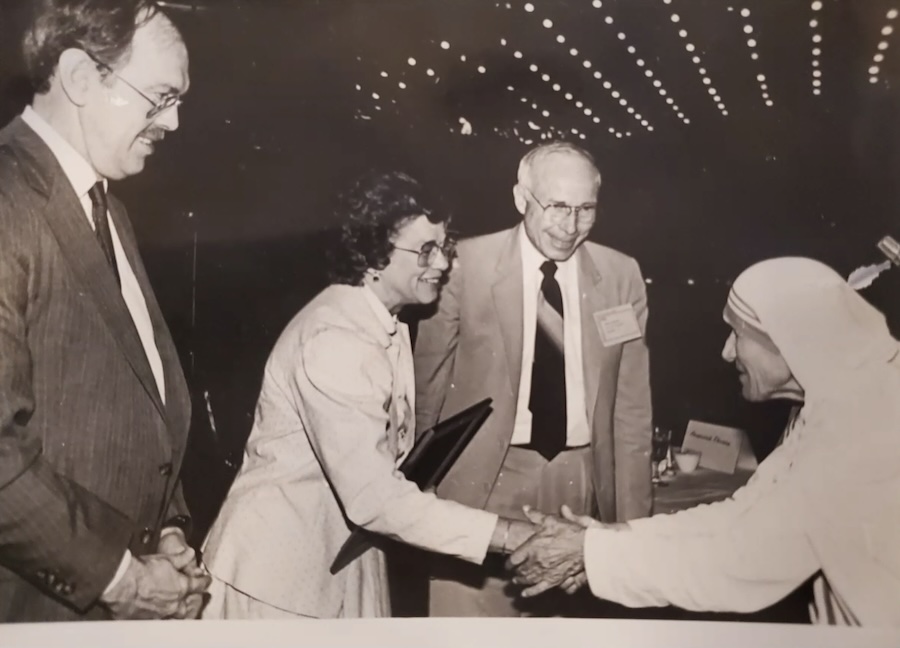Berggren Lecture Series
The annual Berggren Lecture Series is dedicated to Drs. Warren and Gretchen Berggren, longtime advocates of public health and primary care approaches to address poverty and infant mortality.
The Berggrens both graduated from UNMC in the late 1950s and followed their medical education with advanced public health degrees from Harvard. They spent much of their careers providing medical care for the homeless in Omaha, serving as medical missionaries in the Belgian Congo (later Zaire), and developing voluntary community health worker networks to address health globally in low-income countries. Documented outcomes of their work included improve access to food, quality dietary intake, and decreases in stunted growth patterns common in low-income countries, as well as developing strong health care and community partnerships that eradicated tetanus in a region in Haiti where, historically, one in three children were affected.
The Berggren Lecture Series honors the legacy of Drs. Gretchen and Warren Berggren by highlighting current partnerships between public health professionals and clinical and community organizations that:
- Address the most pressing public health issues of our time.
- Study methods to move evidence for health promotion, disease prevention, and public health into typical community settings.
- Move science forward while documenting community improvements in health and well-being.
Past Lectures
Edward Ehlinger, MD
Dr. Ehlinger, MD presented “Public Health in the Space Between ‘No Longer’ and ‘Not Yet.’”
Donald Warne, MD
Dr. Warne presented “Integrating Public Health, Medicine and Indigenous Cultural Approaches to Healing.”
Paul Estabrooks, PhD
Dr. Estabrooks presents the work and successes of Drs. Warren and Gretchen Berggren and is followed by three MPH students, Heidi Hostert, Katelyn Goodroe, and Jacey Hain, who describe their applied-learning experiences in supporting community responses to address the pandemic. The Berggren Lecture Series honors the legacy of the Berggrens by exploring ethical solutions to public health and primary care issues exemplified by these student presentations.
Watch Session 1 on YouTube.
Ruth Berggren, MD, MACP, professor of medicine
Dr. Berggren, a professor of medicine in infectious disease at UT Health in San Antonio, the director of the Center for Medical Humanities and Ethics, and daughter of Warren and Gretchen Berggren. She discusses her experience caring for patients and populations in the wake of disasters and provides lessons learned in the aftermaths of recent disasters such as Hurricane Katrina, the Haiti Earthquake, and the COVID-19 pandemic.
Watch Session 2 on YouTube.
Sharon Stoolman, MD, pediatrician
Dr. Stoolman, associate professor in the UNMC Division of Hospital Medicine and pediatrician at the Children's Hospital and Medical Center, discusses the disparate impact of the COVID-19 pandemic on racial minority communities. Dr. Stoolman explores the historic origins of healthcare disparities in the U.S. and Omaha, reviews the current racial and ethnic disparities caused by the COVID-19 pandemic, and identifies the social determinants of health that affects risk.
Watch Session 3 on YouTube.
Armando De Alba, MD, MPH, assistant professor in the UNMC Department of Health Promotion
Dr. De Alba focuses on health disparities during COVID-19 and advancing health equity. He describes how social determinants of health can cause disparities in the health care system in general and during COVID-19 in particular.
Watch Session 4 on YouTube.
Keith Hansen, MBA, director of the Center for Preparedness and Emergency Response Solutions
Hansen presents "Communicating During Crisis: What Do I Tell Whom, When, and How." He details the importance of crisis communication, describes different ways in which people process information during a crisis, and outlines the principles of crisis and emergency risk communication.
Watch Session 5 on YouTube.
Charleta Guillory, MD, neonatology expert
Dr. Guillory, director of the Texas Children’s Hospital Neonatal-Perinatal Public Health Program, presents “Addressing Disparities in Pre-Term Births in African-American Women: Methods and Results of the Honey Child Project."
Ellyn Ogden, Polio expert
Ogden speaks on “Polio: Getting to Zero,” touching on topics such as data surveillance, epidemiology and communications, understanding communities, conflict resolution, working in fragile states and challenging assumptions.
Henry Perry, MD, PHD, founder of the NGO Curamericas Global
Dr. Perry has over three decades of experience in the management and evaluation of health programs in developing countries. He is the founder of the NGO Curamericas Global, a health organization that works with communities that have some of the highest child and maternal mortality rates in the world and in areas where preventable diseases like malnutrition, pneumonia, and complications from childbirth can quickly lead to death. Measureable impacts on the health of the community are made by focusing on prevention, health education and establishing relationships with existing health facilities.
Learn more here.
Don Krogstad, MD, tropical medicine specialist
Dr. Krogstad presents “Malarial Resistance: Field Testing a New Agent Against Plasmodium Falciparum in Mali – the Scientific, Ethical and Practical Considerations in a Noninferiority Trial,” which reflected on his use of molecular genetic strategies to develop new agents against malaria and the results of a recent trial. He discussed practical and ethical considerations accompanying pharmaceutical research in developing countries.
Dr. Gretchen G. Berggren
Dr. Berggren's lecture, "People, Processes and Technology: Programs that Save Lives," outlines how the two UNMC College of Medicine alums developed census-based, community-oriented global health programs that lowered death and disability rates in the Third World countries.

The Berggren Lecture Series honors Drs. Warren and Gretchen Berggren, longtime advocates of public health approaches to address poverty and infant mortality. Pictured, Drs. Warren and Gretchen Berggren receive the Donald McKay Medal of the American Society of Tropical Medicine from Mother Theresa.